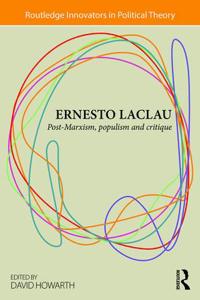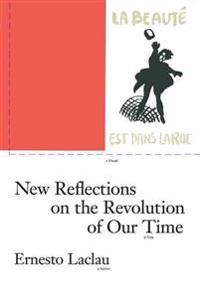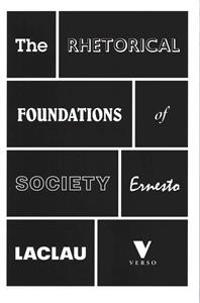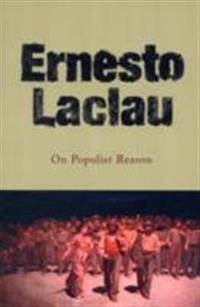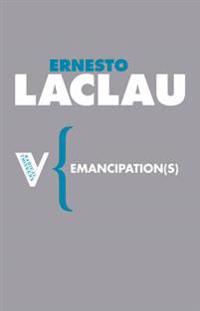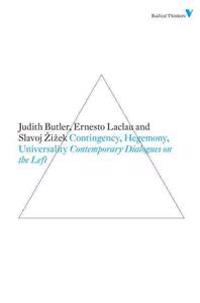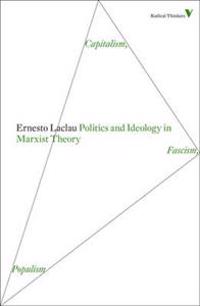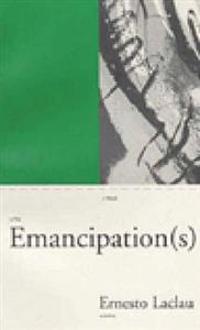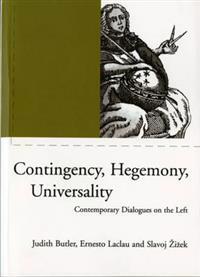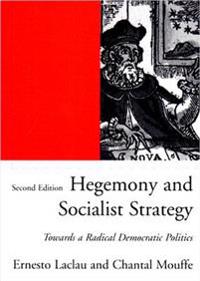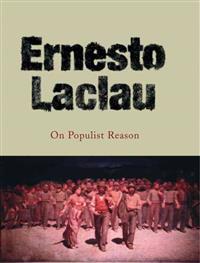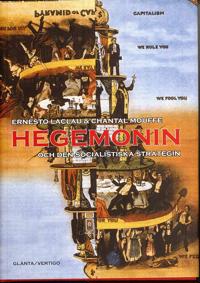Deconstruction and Pragmatism (Häftad)
avSimon Critchley, Jacques Derrida, Ernesto Laclau
ISBN: 9780415121705 - UTGIVEN: 1996-09Deconstruction and pragmatism constitute two of the major intellectual influences on the contemporary theoretical scene; influences personified in the work of Jacques Derrida and Richard Rorty. Both Rortian pragmatism, which draws the consequences of post-war developments in Anglo-American philosoph[...]
Ernesto Laclau (Pocket)
avDavid (EDT) Howarth
ISBN: 9780415870870 - UTGIVEN: 2014-09Ernesto Laclau has blazed a unique trail in political theory and philosophy since the early 1970s. In so doing, he has articulated a range of philosophical and theoretical currents into a coherent alternative to mainstream models and practices of conducting social and political science. The editors [...]
New Reflections on the Revolution of Our Time (Häftad)
avErnesto Laclau
ISBN: 9780860919193 - UTGIVEN: 199011"New Reflections on the Revolution of Our Time" continues the innovative exploration of major issues concerning democracy and socialism which was staked out in "Hegemony and Socialist Strategy." Examining the meanings of social struggle in the context of late capitalism, Laclau situates the re-makin[...]
The Rhetorical Foundations of Society (Pocket)
avErnesto Laclau
ISBN: 9781781681701 - UTGIVEN: 2014-05The essays collected in this volume develop the theoretical perspective initiated in Laclau and Chantal Mouffe's classic "Hegemony and Socialist Strategy. " Central to the argument of "The Rhetorical Foundations of Society "is the establishment of rhetorical tropes--such as metaphor, metonymy and ca[...]
The Rhetorical Foundations of Society (Häftad)
avErnesto Laclau
ISBN: 9781781681718 - UTGIVEN: 2014-05The essays collected in this volume develop the theoretical perspective initiated in Laclau and Mouffe's classic Hegemony and Socialist Strategy, taking it in three principal directions. First, this book explores the specificity of social antagonisms and answers the question What is an antagonistic [...]
On Populist Reason (Pocket)
avErnesto Laclau
ISBN: 9781844671861 - UTGIVEN: 200709This is a tour de force analysis of the forces that drive populism by the renowned political theorist. In this highly original work, Ernesto Laclau continues the philosophical and political exploration initiated in Hegemony and Socialist Strategy. Here, he focuses on the construction of popular iden[...]
Emancipation(s) (Häftad)
avErnesto Laclau
ISBN: 9781844675760 - UTGIVEN: 200612In Emancipation(s), Ernesto Laclau addresses a central question: how have the changes of the last decade, together with the transformation in contemporary thought, altered the classical notion of "emancipation" as formulated since the Enlightenment? Our visions of the future and our expectations of [...]
Contingency, Hegemony and Universality (Häftad)
avSlavoj Zizek, Ernesto Laclau, Judith Butler
ISBN: 9781844676682 - UTGIVEN: 201012The Hegelian legacy, Left strategy, and post-structuralism versus Lacanian psychoanalysis.
Politics and Ideology in Marxist Theory (Häftad)
avErnesto Laclau
ISBN: 9781844677887 - UTGIVEN: 201201Ernesto Laclau is best known for co-authoring Hegemony and Socialist Strategy, with Chantal Mouffe. Politically active in the social and student movements of the 1960s, and a member of PSIN (Socialist Party of the National Left), Laclau's oeuvre links the working class and new social movements. Reje[...]
Emancipation(s) (Häftad)
avErnesto Laclau
ISBN: 9781859841655 - UTGIVEN: 199607In Emancipation(s), Ernesto Laclau addresses a central question: how have the changes of the last decade, together with the transformation in contemporary thought, altered the classical notion of "emancipation" as formulated since the Enlightenment? Our visions of the future and our expectations of [...]
Contingency, Hegemony, Universality (Häftad)
avJudith P. Butler, etc., Ernesto Laclau
ISBN: 9781859842782 - UTGIVEN: 200005What is the contemporary legacy of Gramsci's notion of Hegemony? How can universality be reformulated now that its spurious versions have been so thoroughly criticized? In this ground-breaking project, Judith Butler, Ernesto Laclau and Slavoj Zizek engage in a dialogue on central questions of contem[...]
Hegemony and Socialist Strategy (Häftad)
avErnesto Laclau, Chantal Mouffe
ISBN: 9781859843307 - UTGIVEN: 200103Since its original publication fifteen years ago, this hugely influential book has been at the centre of much debate. The arguments and controversies it has been aroused are, furthermore, far from abating: the disintegration of the Soviet bloc, the emergence of new social and political identities li[...]
The Populist Reason (Inbunden)
avErnesto Laclau
ISBN: 9781859846513 - UTGIVEN: 200507In this new and highly original work Ernesto Laclau continues the philosophical and political exploration initiated in Hegemony and Socialist Strategy, New Reflections on the Revolution of Our Time and Emancipation(s). his topic here is the construction of popular identities, conceived in a wide sen[...]
Hegemonin och den socialistiska strategin (Inbunden)
avErnesto Laclau, Chantal Mouffe
ISBN: 9789185000609 - UTGIVEN: 200808Hegemonin och den socialistiska strategin (1985) är en klassiker inom den politiska teorin, en given referenspunkt för dagens samhällsdebatter och ett av huvudverken inom diskursanalysen.
Genom utmanande och engagerande läsningar av marxistiska 1900-talsklassiker som Karl Kautsky[...]Fronesis 34 Kampen om folket (Tidskrift)
avErnesto Laclau, Cas Mudde, Antonio Negri
ISBN: 9789197747912 - UTGIVEN: 201009I Fronesis nr 34 diskuteras folkets betydelse för demokratin. Vilket är det »folk« som ständigt åberopas för att genomdriva samhällsförändringar eller upprätthålla status quo? Vi undersöker folkbegreppets historia, samtida uttryck för populism och diskuterar folkmaktens betydelse i en [...]


